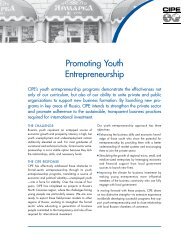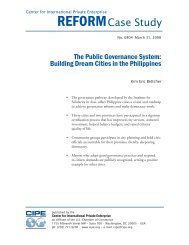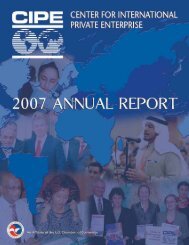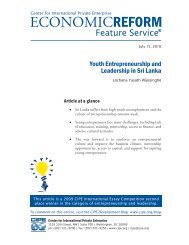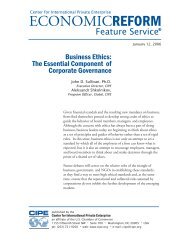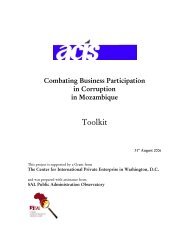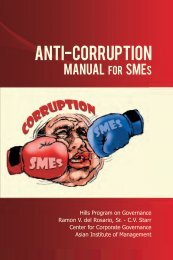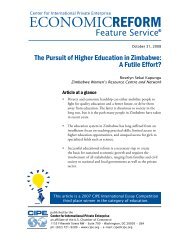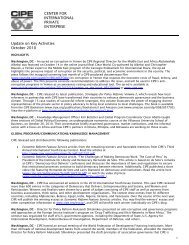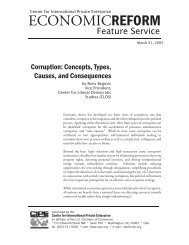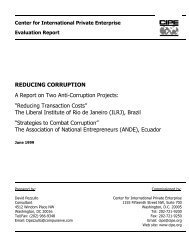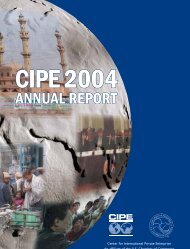Responsible Business Guide: A Toolkit for Winning Companies
Responsible Business Guide: A Toolkit for Winning Companies
Responsible Business Guide: A Toolkit for Winning Companies
You also want an ePaper? Increase the reach of your titles
YUMPU automatically turns print PDFs into web optimized ePapers that Google loves.
RBG<br />
<strong>Responsible</strong> <strong>Business</strong> <strong>Guide</strong>: A <strong>Toolkit</strong> <strong>for</strong> <strong>Winning</strong> <strong>Companies</strong><br />
Emerging Power of the Stakeholder<br />
Stakeholder power is manifested through an individual’s ability to increase uncertainty or<br />
risk in a company’s business plans, which affects the degree to which a company requires<br />
his or her goodwill. This is true <strong>for</strong> both internal stakeholders, such as owners, managers,<br />
employees, and employee families, and external stakeholders.<br />
While internal stakeholders may seek to cut corners <strong>for</strong> maximizing profits, external<br />
stakeholders have the power to block such motivation through threats ranging from<br />
industrial action to public campaigns and political lobbying that may cause suppliers or<br />
creditors to pull back or consumers to turn away. This trend has become increasingly<br />
apparent in the past decade. A recent example is from India, in which the state of Kerala<br />
sealed a Coca-Cola bottling unit in response to unproven allegations by the local community<br />
that the plant extracted excessive amounts of water from the ground and returned it in a<br />
polluted state. The Indian Parliament is reported to have banned Coca-Cola in its cafeteria,<br />
stating the company used polluted water. The company is also facing a boycott from the<br />
University of Michigan <strong>for</strong> its approach to water scarcity and pollution issues in India. As<br />
a result, Coca-Cola has lost much more than the 16 million dollars it invested in its Kerala<br />
plant.<br />
While larger, more visible enterprises often come into focus as the objects of stakeholder<br />
interest, smaller companies also feel the pressure. There are more and more reported<br />
instances of otherwise invisible stakeholders, particularly investors or local communities,<br />
challenging a company’s claims and often succeeding in changing business decisions to<br />
All animals are equal<br />
but some are more<br />
equal than others.<br />
George Orwell<br />
Animal Farm<br />
align with their expectations. A recent example from Pakistan is Nike’s<br />
2006 decision to withdraw manufacturing from its contractors in the<br />
country following reports of unfair labor practices. However, in the<br />
face of stakeholder concerns, and possibly fearing that hostile public<br />
opinion would hurt product sales, the company announced it would<br />
stay in Pakistan, with a new supplier.<br />
Stakeholder influence may have a global impact, as in the case of a declared boycott of<br />
Danish products by Arab nations in 2008, following the publication of a Danish cartoon<br />
ridiculing Muslim beliefs. The Danish government had to take diplomatic steps to prevent<br />
potential loss to its companies doing business in the Middle East.<br />
No decision in today’s business world is strictly internal because of the power of social<br />
media and the speed at which it can rally opinion around the world. Smart businesses are<br />
reacting to this, not by raising barriers, but by pulling them down. <strong>Companies</strong> are going<br />
beyond simple marketing slogans and disclosure programs to actually engage with identified<br />
stakeholders and seek community views on investments.<br />
corporate social responsibility as principles of corporate conduct.<br />
<strong>Responsible</strong> <strong>Business</strong> Initiative 39



